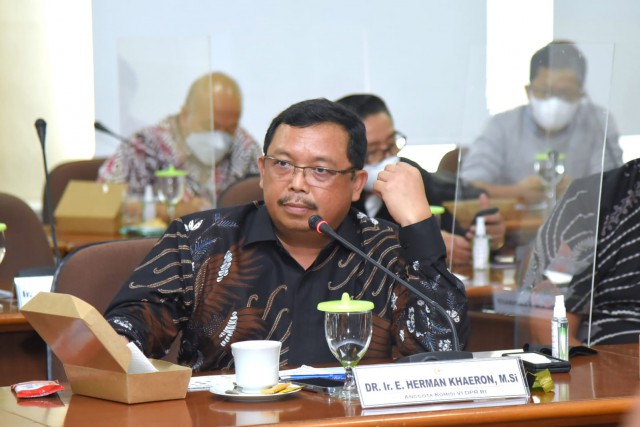Member of Commission VI DPR RI Herman Khaeron assessed that PT Perkebunan Nusantara (PTPN) which controls 600 thousand tons of cooking oil production, with only one production factory located in North Sumatra, is not enough to be a stabilizer to meet cooking oil needs. Herman assessed that, from land tenure, crude palm oil (CPO) production and cooking oil yields are not sufficient to overcome the current situation of skyrocketing cooking oil prices. The control of cooking oil is much larger controlled by the private sector.
“I’m sorry I don’t discredit the private sector, but this is a matter of the livelihood of many people, in which all policies are returned to the state. Thus, even if there is an assignment, it must be reviewed first, so that it does not become a burden,” said Herman after attending a meeting of the Commission VI DPR RI’s Special Working Visit Team with the Director of Human Resources for Holding Perkebunan Nusantara III (Persero) Seger Budiarjo and the Chief Executive Officer of PTPN V Jatmiko Santosa, in Pekanbaru, Riau, Thursday (January 27, 2022).
“I was asked (to PTPN), is it profitable for PTPN to carry out market operations with the highest benchmark price per liter of IDR 14,000? They said it had to be subsidized at Rp. 3000 per liter. This means that if there is a subsidy, there will be losses when the government operates the cheap cooking oil market, it is very unfortunate. With these losses, the state should never again order or assign state-owned companies. You can lose again,” continued Herman.
According to the Democrat Party politician, if the assignment from the state is forced on a state-owned company, it will become a big burden and responsibility. “If the corporation becomes a loss, there will be no dividend. The rest, if the debt gets heavier, the impact on the reduction of the workforce, then will reduce the ability of SOEs to absorb workers. For that, in the future, if there is an assignment, it is hoped that compensation will be in accordance with the size of the assignment,” suggested Herman.
This member of the Legislative Body (Baleg) of the DPR RI asked that if there were any more assignments to state-owned companies related to the livelihoods of many people, the government should be able to measure the company’s capabilities, so as not to burden all parties. According to him, SOEs must control at least 50 percent of production results related to commodities for the people’s livelihood. This means that from the existing numbers, SOEs do not have to control all oil palm plantations, but must be able to control at least production above 50 percent, only then can they stabilize prices at the community level.
“Whatever happens in the international world, of course this can be managed by BUMN. PTPN as the executor assigned by the state to be able to control the livelihood sector of the people must continue to be raised, in order to be able to balance the situation of price pressure due to market competition. In my opinion, state policies must be corrected, enlarge the area, expand production, be balanced from what currently only controls 6 percent. In the future, it is expected to be able to control 50 percent,” suggested the West Java VIII electoral district legislator.
“So that one day this commodity becomes scarce in the international world and we can stabilize prices for more affordable people. Of course, expanding market share and production will create a strong foundation for the country to prosper the people, because there will be greater income. If the dividends of SOEs are higher, debts can be settled, then the people can be open to cooperating with SOEs. So, there is a lot of value in using it,” concluded Herman.









